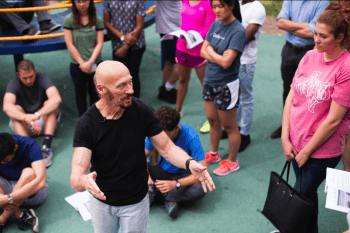Bob Hansman is an Associate Professor of Architecture at Washington University’s Sam Fox School of Design & Visual Arts and a Community Engagement Faculty Fellow at the Gephardt Institute. He was recently featured on St. Louis Public Radio for his involvement in one of the School of Medicine’s most significant traditions.
Every year for the past fifteen years, first-year medical students have gone on a bus tour through the city of St. Louis’s poorest neighborhoods and learned about environments that may increase the risk of health issues like cancer, chronic illness, and premature death.
This year, Professor Bob Hansman met students at their first stop in the Ivory Perry Park neighborhood, just two miles away from the School of Medicine campus. He shared powerful accounts of violence in the park. “There are places in this city now that have been so depleted of resources of people,” he said, “that packs of feral wild dogs can run through the neighborhoods looking for something to eat.” Hansman explained the tragic story of 10-year-old Rodney McAllister, who was attacked and killed by a pack of wild dogs while playing alone in the park. “People in the city spent a lot of time pointing fingers at each other. Nobody wanted to see themselves as part of this larger pattern that could create a situation where a… child in 2001 could be eaten alive…”
Ivory Perry Park is one of the city’s many neighborhoods that experienced a massive exodus beginning in the 1950s, resulting in under-population, abandoned properties, and an influx of crime. For many students, the bus tour marks their first time in an area with high poverty and crime rates. Hansman encouraged the students to use their medical knowledge to help communities plagued by these issues.
After more than a decade of incorporating the tour into medical school orientation, Dr. Will Ross, a kidney specialist and Associate Dean of Diversity at the School of Medicine, sees the potential to start shaping his students’ perspectives early. He summed that, “When we were students we would ask, ‘Do you smoke? Do you drink alcohol?’… The social history was like a line and a half. Now I look, and they’re like a paragraph. They truly know how to ask the right questions: ‘What’s happening in your life?’”
View the full story and video here.
Click here to learn about Hansman’s community engagement work and new book, Pruitt-Igoe.
